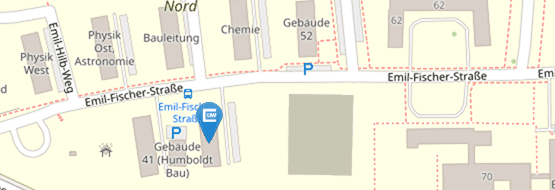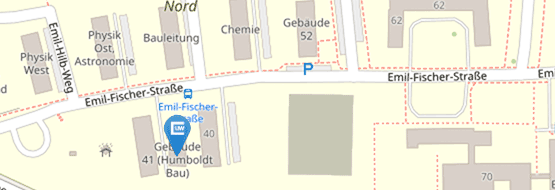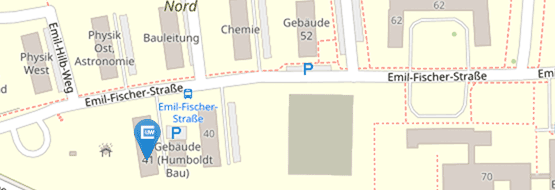Areas of Research
The focus of our research is on current issues of mathematical analysis in the fields of calculus of variations and partial differential equations, mainly with applications in the natural and materials sciences.
In the calculus of variations we work on
- non-convex variational problems and
- passages from discrete to continuous systems.
The non-convex variation problems are often driven by applications in the nonlinear theory of elasticity or in the formation of microstructures in shape memory materials. For this, estimates of quasiconvex functions are of interest. In the case of cubic-to-monoclinic phase transformations, triplets of pairwise non-compatible transformation matrices that predict non-trivial microstructure formation were found in the geometric-linear case [CS]. The characterization of symmetric polyconvexity and the example of a quadratic function that is symmetric quasiconvex, but not symmetric polyconvex [BoKS], place classical results of calculus of variations in the context of geometrically linear elasticity theory.
With regard to the existence of solutions for mechanically realistic energies, [BeKS] gives a refinement of the theory of second-gradient models, which is based on the concept of polyconvexity. Applications of shape memory materials can be found in [KPS].
In the transition from discrete to continuous systems, we work on one-dimensional chains of atoms that interact via non-convex potentials that allow for breaks [SSZ, ScSc]. The continuum limit is carried out using Gamma-convergence methods. In recent work, we have been able to allow for external forces [CFS] as well as composite materials [LSS]. Furthermore, it is possible to check experimental results for fracture in heterogeneous nanowires in a passage from discrete to continuous systems [LPS15, LPS17].
New formulas for magnetic forces between very small-spaced bodies were derived from a discrete three-dimensional model [S]. Stochastic homogenization of non-convex variation problems is discussed in [NSS] and [LNSS].
- [BeKS] B. Benešová, M. Kružík, A. Schlömerkemper: A note on locking materials and gradient polyconvexity, Math. Mod. Meth. Appl. Sci. 28 (2018), 2367–2401.
- [BoKS] O. Boussaid, C. Kreisbeck, A. Schlömerkemper: Characerizations of Symmtric Polyconvexity, Archive for Rational Mechanics and Analysis volume 234, pages 417-451(20
- [KPS] M. Kružík, P. Pelech, A. Schlömerkemper: Gradient Polyconvexity in Evolutionary Models of Shape-Memory Alloys, Journal of Optimization Theory and Applications 184, pages 5-20(2020)
- [CFS] M. Carioni, J. Fischer, A. Schlömerkemper: External forces in the continuum limit of discrete systems with non-convex interaction potentials: Compactness for a Γ-development, arXiv:1811.09857
- [CS] I.V. Chenchiah and A. Schlömerkemper, Non-Laminate Microstructures in Monoclinic-I Martensite, Arch. Rational Mech. Anal.207, 39-74 (2013), arXiv:1201.6679 [Postprint version] [OPUS Würzburg]
- [LNSS] L. Lauerbach, S. Neukamm, M. Schäffner and A. Schlömerkemper, Stochastic Homogenization in the Passage from Discrete to Continuous Systems - Fracture in Composite Materials, in preparation
- [LSS] L. Lauerbach, M. Schäffner and A. Schlömerkemper, On continuum limits of heterogeneous discrete systems modelling cracks in composite materials, GAMM-Mitt.40, 178-200 (2017)
- [LPS17] G. Lazzaroni, M. Palombaro and A. Schlömerkemper, Rigidity of three-dimensional lattices and dimension reduction in heterogeneous nanowires, Discrete Contin. Dyn. Syst. S10, 119-139 (2017), arXiv:1501.07505
- [LPS15] G. Lazzaroni, M. Palombaro and A. Schlömerkemper, A discrete to continuum analysis of dislocations in nanowire heterostructures, Comm. Math. Sci.13, 1105-1133 (2015), arXiv:1308.3505 [Postprint version]
- [KPS] M. Kružík, P. Pelech, A. Schlömerkemper: Gradient Polyconvexity in Evolutionary Models of Shape-Memory Alloys, J. Optim. Theory Appl., online first 02/2019.
- [NSS] S. Neukamm, M. Schäffner and A. Schlömerkemper, Stochastic homogenization of nonconvex discrete energies with degenerate growth, SIAM J. Math. Anal.49, 1761-1809 (2018), arXiv:1606.06533
- [SSZ12] L. Scardia, A. Schlömerkemper and C. Zanini, Towards uniformly Gamma-equivalent theories for nonconvex discrete systems, Discrete Contin. Dyn. Syst. B,17, 661-686 (2012) [Preprint version. Published by AMS. All rights reserved.]
- [SSZ11] L. Scardia, A. Schlömerkemper and C. Zanini, Boundary layer energies for nonconvex discrete systems, Math. Models Methods Appl. Sci., 21, 777-817 (2011) [Postprint version. Electronic version © DOI]
- [ScSc18] M. Schäffner and A. Schlömerkemper, On Lennard-Jones systems with finite range interactions and their asymptotic analysis,, Networks and Heterogeneous Media 18, 95-118 (2018), arXiv:1501.06423
- [ScSc15] M. Schäffner and A. Schlömerkemper, On a Gamma-convergence analysis of a quasicontinuum method, Multiscale Model. Simul.13, 132–172 (2015), arXiv:1405.6122 [Published version]
- [S] A. Schlömerkemper, Mathematical derivation of the continuum limit of the magnetic force between two parts of a rigid crystalline material, Arch. Rational Mech. Anal.176, 227-269 (2005) [Postprint version]
The interest in the theory of partial differential equations, which does not concern the calculus of variations, has clearly increased in the group in recent years. In particular, we deal with existence and uniqueness issues for solutions of systems of partial differential equations that model the evolution of magneto-viscoelastic materials. This system includes the (in-)compressible Navier Stokes equations, an evolution equation for the deformation gradient and the Landau-Lifshitz-Gilbert equation or a gradient-flux equation for the magnetization [BFLS, SZ].
A study of the Allen-Cahn / Cahn-Hilliard equations in the context of the geometrically linear theory of elasticity gave first statements of existence and uniqueness [BS].
Refined regularity results for solutions of the Poisson equation with transmission condition in non-smooth domains were shown in [S].
F. De Anna also works on some analytical questions for models in the field of liquid crystals.
J. Ratzkin is interested in geometric aspects of partial differential equations.
- [BFLS] B. Benešová;, J. Forster, C. Liu and A. Schlömerkemper, Existence of weak solutions to an evolutionary model for magnetoelasticity, SIAM J. Math. Anal.50, 1200–1236 (2018), arXiv:1608.02992
- [BS] T. Blesgen and A. Schlömerkemper, On the Allen-Cahn/Cahn-Hilliard-System with geometrically linear elastic energy, Proc. Roy. Soc. Edin.144, 241-266 (2014), arXiv:1202.5197 [Postprint version]
- [KNS] M. Kalousek, Š. Nečasová, A. Schlömerkemper, Extensibility of a system of transport equations in the case of an impermeable boundary, arXiv:1812.03236.
- [S] A. Schlömerkemper, About solutions of Poisson's equation with transition condition in non-smooth domains, Z. Anal. Anwend.27, 253-281 (2008) [MPI-MIS preprint 53/2006]
- [SZ] A. Schlömerkemper J. Žabenský: Uniqueness of solutions for a mathematical model for magnetoviscoelastic flows, Nonlinearity 31 (2018), 2989–3012.
Our analytical research is often driven by questions from the theory of elasticity [BS], dislocations [LPS17, RSC], and cracks, or the physical behavior of magnetic materials [S]. In addition to the purely scientific interest, we also focus on the further development of smart materials, such as shape memory materials [FHS, KPS], nanomaterials [LPS17, LSS], composit materials [LPS17, LSS] or magnetoviscoelastic materials [BFLS].
- [BFLS] B. Benešová,, J. Forster, C. Liu and A. Schlömerkemper, Existence of weak solutions to an evolutionary model for magnetoelasticity, SIAM J. Math. Anal.50, 1200–1236 (2018), arXiv:1608.02992
- [BS] T. Blesgen and A. Schlömerkemper, On the Allen-Cahn/Cahn-Hilliard-System with geometrically linear elastic energy, Proc. Roy. Soc. Edin.144, 241-266 (2014), arXiv:1202.5197 [Postprint version]
- [FHS] R. Fechte-Heinen, A. Schlömerkemper, About lamination upper and convexification lower bounds on the free energy of monoclinic shape memory alloys in the context of T3-configurations and R-phase formation, Cont. Mech. Thermodyn.28, 1601-1621 (2016)
- [KPS] M. Kružı́k, P. Pelech, A. Schlömerkemper: Gradient Polyconvexity in Evolutionary Models of Shape-Memory Alloys, J. Optim. Theory Appl., online first 02/2019
- [LPS17] G. Lazzaroni, M. Palombaro and A. Schlömerkemper, Rigidity of three-dimensional lattices and dimension reduction in heterogeneous nanowires, Discrete Contin. Dyn. Syst. S10, 119-139 (2017), arXiv:1501.07505
- [LSS] L. Lauerbach, M. Schäffner and A. Schlömerkemper, On continuum limits of heterogeneous discrete systems modelling cracks in composite materials, GAMM-Mitt.40, 178-200 (2017)
- [RSC] C. Reina, A. Schlömerkemper, S. Conti, Derivation of F=FeFp as the continuum limit of crystalline slip, J. Mech. Phys. Solids 89 231-254 (2016), arXiv:1504.06775
- [S] A. Schlömerkemper, Mathematical derivation of the continuum limit of the magnetic force between two parts of a rigid crystalline material, Arch. Rational Mech. Anal.176, 227-269 (2005) [Postprint version]





